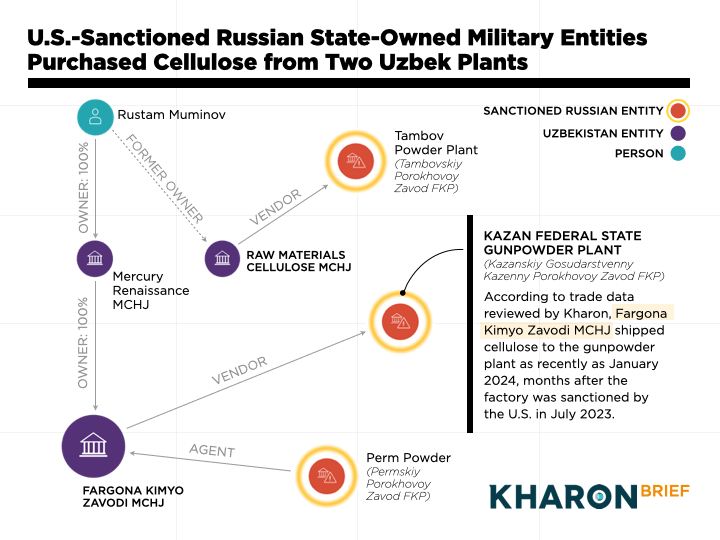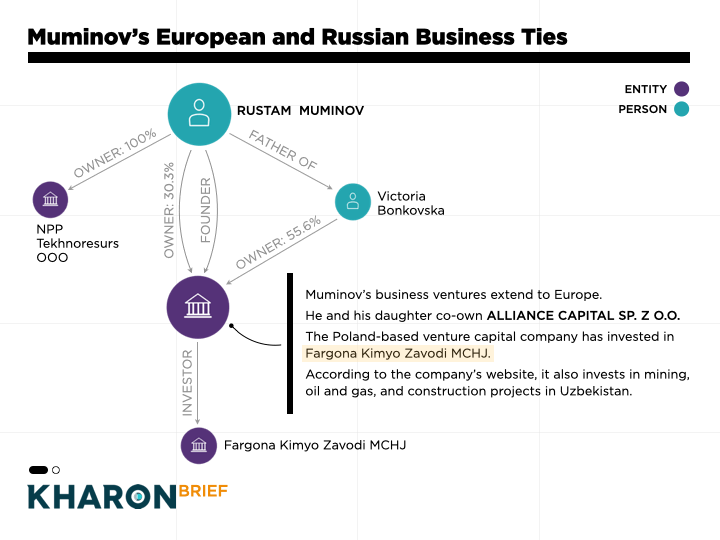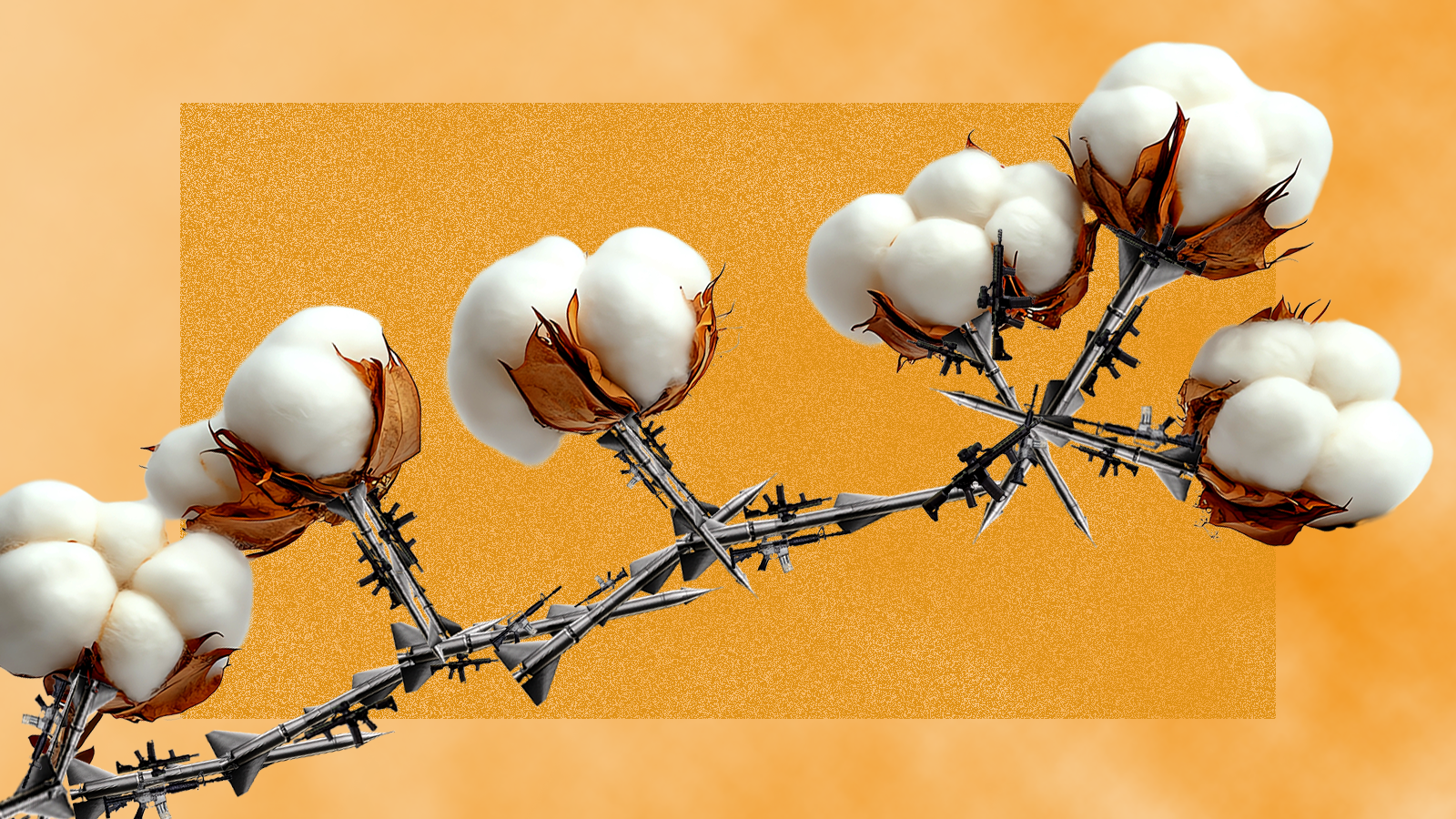Update, 10/24/25: The European Union this week designated Rustam Muminov, the subject of this Brief piece, for “supporting Russia’s military and industrial complex.” The Fargona chemical plant that Muminov controls, the EU said, has supplied cotton pulp to two entities that have used it “to manufacture weapons for the Russian Armed Forces.”
You can read more about the EU’s 19th sanctions package against Russia here.
Since Russia’s invasion of Ukraine in February 2022, two factories in Uzbekistan have played a critical role in supplying materials to support Russia’s military efforts, including its production of explosives.
According to trade data reviewed by Kharon, the plants—Fargona Kimyo Zavodi MCHJ and Raw Materials Cellulose MCHJ—have supplied more than $170 million worth of cellulose to Russian munitions factories, defense contractors, and other military end users.
Both plants are connected to Rustam Muminov, a Russian national with deep ties to Uzbekistan’s cotton industry. Muminov currently owns Fargona Kimyo Zavodi, while he previously owned Raw Materials Cellulose, transferring his shares to other individuals in 2024.
The cellulose produced by these factories has been purchased by several major Russian military suppliers, including the state-owned Kazan Federal State Gunpowder Plant, Perm Powder Plant, and Tambov Powder Plant—each of which was sanctioned by the U.S. Department of the Treasury in 2023 for its role in supporting Russia’s defense industrial base.
You can read more about the EU’s 19th sanctions package against Russia here.
Since Russia’s invasion of Ukraine in February 2022, two factories in Uzbekistan have played a critical role in supplying materials to support Russia’s military efforts, including its production of explosives.
According to trade data reviewed by Kharon, the plants—Fargona Kimyo Zavodi MCHJ and Raw Materials Cellulose MCHJ—have supplied more than $170 million worth of cellulose to Russian munitions factories, defense contractors, and other military end users.
Both plants are connected to Rustam Muminov, a Russian national with deep ties to Uzbekistan’s cotton industry. Muminov currently owns Fargona Kimyo Zavodi, while he previously owned Raw Materials Cellulose, transferring his shares to other individuals in 2024.
The cellulose produced by these factories has been purchased by several major Russian military suppliers, including the state-owned Kazan Federal State Gunpowder Plant, Perm Powder Plant, and Tambov Powder Plant—each of which was sanctioned by the U.S. Department of the Treasury in 2023 for its role in supporting Russia’s defense industrial base.

Kharon users can explore this Insight in greater detail through the ClearView platform.
A Key Ingredient in Military Manufacturing
Cellulose, derived from cotton, is a key ingredient in the production of nitrocellulose, or “guncotton,” a highly flammable compound essential for rockets, gunpowder, and various military applications. The chemical process to create nitrocellulose involves treating cellulose with nitric and sulfuric acids, making it a critical material in weapons manufacturing and other explosive-related industries.
Muminov’s Business Empire
Muminov, who according to a PBS NewHour report “controls about 85% of Uzbekistan’s cotton pulp exports to Russia,” has built a significant business empire around these critical supplies. Uzbekistan, a major cotton producer, has supplied Russia since the Soviet era, and Muminov has come to dominate that flow.
In addition to his interests in Uzbekistan, his business activities extend to Europe, where he holds a stake in a venture capital firm, and to Russia, where he has a stake in the manufacturing sector.
Cellulose, derived from cotton, is a key ingredient in the production of nitrocellulose, or “guncotton,” a highly flammable compound essential for rockets, gunpowder, and various military applications. The chemical process to create nitrocellulose involves treating cellulose with nitric and sulfuric acids, making it a critical material in weapons manufacturing and other explosive-related industries.
Muminov’s Business Empire
Muminov, who according to a PBS NewHour report “controls about 85% of Uzbekistan’s cotton pulp exports to Russia,” has built a significant business empire around these critical supplies. Uzbekistan, a major cotton producer, has supplied Russia since the Soviet era, and Muminov has come to dominate that flow.
In addition to his interests in Uzbekistan, his business activities extend to Europe, where he holds a stake in a venture capital firm, and to Russia, where he has a stake in the manufacturing sector.

Kharon users can explore this Insight in greater detail through the ClearView platform.
Uzbekistan’s cellulose exports to Russia, facilitated by Muminov’s network, play a crucial role in sustaining Russia’s defense operations amid ongoing international sanctions and trade restrictions. As Russia’s need for materials like nitrocellulose continue, Uzbekistan’s factories remain key players in this increasingly complex geopolitical dynamic.
More from the Kharon Brief on Russia:
More from the Kharon Brief on Russia:







